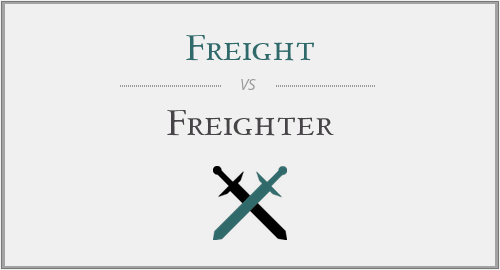Introduction
The words 'Freight' and 'Freighter' are encountered frequently in logistics and transportation contexts, often leading to confusion due to their apparent similarity. However, they serve different linguistic functions and have distinct historical backgrounds. In this article, we will explore their differences and similarities, emphasizing grammar, etymology, and real-world usage.
Definition and Usage
Freight
'Freight' is primarily a noun that refers to goods or cargo transported in bulk by land, sea, or air. It encompasses various items, materials, or commodities being shipped from one place to another. Here are examples of 'Freight' in sentences:
- "The freight on that cargo ship includes containers of electronics and textiles."
- "The railroad company handles the transportation of freight across the country."
Freighter
'Freighter,' in contrast, is a noun referring to a specific type of vessel or aircraft used for transporting freight. It describes a mode of transport designed to carry cargo efficiently. Examples of 'Freighter' in sentences include:
- "The freighter departed from the harbor, loaded with containers of goods."
- "A cargo freighter is essential for international trade."
Grammatical Roles
Grammatically, 'Freight' functions as a noun and is typically the subject or object of a sentence, or it can be part of a prepositional phrase:

- "The company specializes in shipping freight worldwide."
- "He unloaded the freight from the truck at the warehouse."
'Freighter,' on the other hand, is a noun specifying a type of vehicle and usually acts as the subject in sentences discussing transportation or logistics:
- "The freighter departed on schedule, despite the bad weather."
- "A cargo freighter is vital for the timely delivery of goods."
Origins
The words 'Freight' and 'Freighter' have distinct origins:
- 'Freight' comes from the Old English word 'freoht,' meaning 'payment' or 'tribute.' Over time, it evolved to represent the goods or cargo carried by ships, trains, and trucks.
- 'Freighter' is a derivative of 'freight' with the suffix '-er,' which often indicates a person or thing that performs a particular action. In this case, a 'freighter' is a vehicle designed for carrying 'freight.'
Conclusion
In conclusion, 'Freight' and 'Freighter' are related terms with distinct meanings, grammatical functions, and historical origins. 'Freight' refers to the cargo or goods being transported, while 'Freighter' specifies the type of vehicle or vessel used for transporting that cargo. Understanding these differences is essential for effective communication, especially in the fields of transportation, logistics, and commerce.




Have a discussion about this article with the community:
Report Comment
We're doing our best to make sure our content is useful, accurate and safe.
If by any chance you spot an inappropriate comment while navigating through our website please use this form to let us know, and we'll take care of it shortly.
Attachment
You need to be logged in to favorite.
Log In